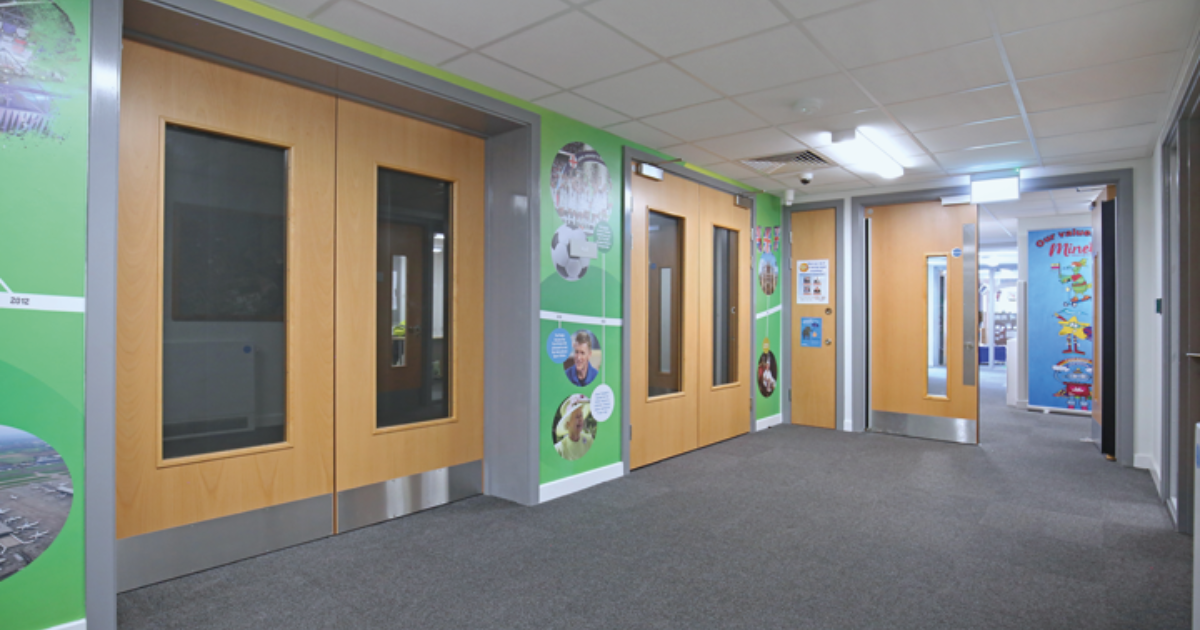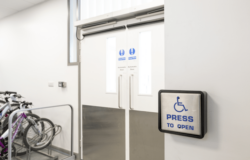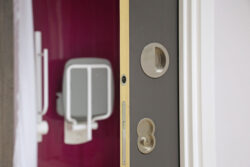Thinking ahead, getting ready for the new school year
The summer holidays are the ideal time for onsite work before students return in September. An empty building gives facilities and maintenance staff the freedom to inspect and repair ironmongery as needed. This also allows them to conduct fire and safety inspections without causing disruptions.
Getting started is the hardest part, so we prepared this blog post to outline the necessary maintenance procedures for our products.
Why is maintenance important?
Proactive maintenance is critical to increasing the safety, security, and compliance of all our architectural ironmongery solutions and doorsets. We strongly recommend using maintenance checklists that include all aspects, such as fitting, operation, fixes, and finishes. This verifies that everything works properly and conforms with all legal regulations.
Doorset maintenance
We test our doorsets’ durability to ensure they can withstand extreme, repetitive abuse. Fire-certified doors are tested to meet the required fire safety criteria, including smoke protection. Despite this, doors in places with major foot traffic are vulnerable to damage or wear from repetitive, long-term use. We often observe deterioration in two main forms: damage to the surface or components forming the doors’ assembly, and wear on the door hardware or erosion of fixings, which prevents the door from self-closing and destroys the fire barrier made by the seal.
Regular inspection and maintenance are critical for maintaining our performance and fire resistance standards. The summer holidays provide an ideal opportunity to conduct these inspections thoroughly, as the absence of students allows uninterrupted access to all areas. The frequency of maintenance checks depends on the door’s usage; nevertheless, we advise all doors to be checked regularly. A weekly or monthly inspection is recommended for doors on busy routes, whereas doors used infrequently or by very few people may only require annual inspections. Inspections should assess the operation of the doors and the preservation of the operating gap sizes, as described in the test standards relevant to each door. They should also focus on the preservation of elements that are vulnerable to wear and damage, such as glass and hardware, acoustic and smoke seals, and applied finishes.
Wear and tear of ironmongery
Incorrect cleaning is the main cause of ironmongery damage, so care must be taken. Simple but regular cleaning is recommended to tackle dust and moisture, which are the main natural hazards affecting ironmongery. Irreparable damage can be caused by certain metal polishes, harsh abrasive cleaners, or emery cloths on an electrically deposited surface.
Handles
Correctly installed lever handles should only require occasional checks. This includes checking the tightness of the fixings, the alignment on either side of the door, the seating of the levers in the backplate, and the tension of the grub screw fixing the lever to the spindle. Less frequent checks can be made to ensure they operate smoothly and return to the correct position, and the thumb turns operate the deadbolt smoothly. Check pull handles to ensure all the fixings are tight, as loose pull handles can damage the door face and become unstable.
Hinges and door closers
These are essential to doors functioning correctly on a daily basis, but more importantly in the event of a fire.
Hinges must be fitted correctly for efficient operation, loose hinges are typically due to poor alignment or incorrect screws. Squeaking hinges are often from a lack of lubrication; where this occurs frequently, pin misalignment should be investigated. It’s important to check for wear that may inhibit the free movement of the door or cause it to drop. Screws must be checked and tightened where necessary, this may require realigning the hinges or replacing the screws with a more robust type. If necessary, light machine oil can be applied to the hinge knuckles.
Door closers should be checked weekly, with fire precaution hardware being checked in accordance with current Fire Precautions Regulations. The operator should be checked for correct functioning, ensuring it closes the door fully in the latched position from a variety of angles. The fixings of the door closer body are subject to the most stress and should therefore be checked to ensure they are still tight.
While there is little routine maintenance needed because all internal parts are immersed in oil, the body should still be checked for oil leakage, which indicates a failing device. Light oil lubricant should be applied to exposed pivot points if the door is not operating smoothly. Electrically held-open devices and associated sensors or alarms should be checked once a week. The correct functioning of the door closure and ancillary equipment, including the transformer and PSU, must be checked so any problems with the system can be rectified immediately.
Locks
Over the summer, cylinders and keys may need to be replaced if staff are leaving or keys are lost. Many schools will opt to upgrade cylinders to put stronger security measures in place. We wrote a blog post on this topic previously, which you can find here.
When checking locks and latches, correct operation is a priority, as this is often affected by the movement of the door or climatic conditions. This results in the latch and deadbolts being unable to engage the striking plate, requiring an adjustment to their position on the frame. Mortices should also be checked to ensure no debris has entered the lock case. Unrestricted movement of the deadbolt is vital to the door’s operation, so the holes in the frame behind the striking plate should be checked for the correct depth and the absence of foreign matter.
For smooth operation, keys and thumb turns must be checked for correct engagement of the cylinder. Fixings surrounding the lock and lever furniture should also be checked to ensure they’re tight and secure. While lubricant must occasionally be applied to the striking face of latch bolts, grease, oil, or graphite should not be used as this can attract dust or hinder the mechanism’s smooth operation. A proprietary lock spray is available. This is the only product that should be used for maintenance.
Door automation
As an addition to our installation teams, we offer maintenance contracts to ensure the continued high-performance of our automatic door operators. These contracts can be tailored to the unique needs of each school to accommodate varying door usage, environmental conditions, and the age of the equipment. Regular inspections and servicing are vital to prevent unexpected breakdowns and ensure the safe operation of the device. The main checks that should be performed include checks on sensors, safety features, and compliance with local building regulations.
Swing operator cleaning and maintenance
Preventive maintenance is crucial for the longevity and safe operation of swing operators. We recommend a weekly cleaning schedule for the aluminium cover, activation & safety sensors, and stainless steel components. Ensure plastic lenses are clean and dust-free and use mild soap and water for cleaning anodised aluminium and polyester powder-coated aluminium surfaces. Avoid using harsh chemicals and abrasive cleaners that can damage the finish.
Daily safety checks
For automatic swing doors, perform daily safety checks to ensure they are operating correctly. This includes checking the motion detection actuation, ensuring the door opens and closes smoothly, and verifying that all safety sensors are functional. If any issues are found, discontinue the door’s operation and contact the service department immediately.
Maintenance Contracts
Lloyd Worrall offers pre-planned maintenance services for various access and egress solutions, including automatic door operators, automatic gates, roller shutter doors, access control systems, intercoms, and CCTV. Our maintenance contracts cover bi-annual visits from ADSA-approved engineers to ensure your equipment meets BS7036 and EN16005 safety standards. Regular maintenance checks guarantee maximum equipment lifespan and prevent unnecessary breakdowns.
This summer, take advantage of the quieter period to carry out these essential maintenance tasks. Ensuring all doorsets and ironmongery are in optimal condition will provide peace of mind and enhance safety for the upcoming school year.
Let us help
Although continuing maintenance is the responsibility of the premises owner, we are here to help and provide advice and support. We can provide cleaning and maintenance guides, attend site to discuss and advise on your fire door checklist and supply all your refurbishment items, from keys, cylinders and door handles to signage and finger protection devices.
We also have a variety of maintenance contracts in place to ensure the safety and security of our door automation solutions. Our skilled team of engineers can work with your organisation to carry out routine maintenance efficiently and professionally, ensuring standards and regulations are upheld. Get in touch via enquiries@lloydworrall.co.uk.
Back To News





